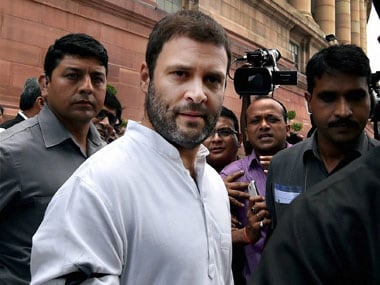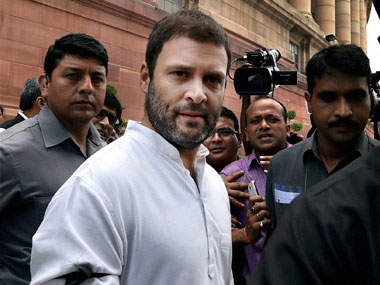A tweet by Congress president Rahul Gandhi drew attention to a government letter from the Department of Personnel and Training seeking comments of other departments on a suggestion from the Prime Minister’s Office (PMO).
Rise up students, your future is at risk! RSS wants what’s rightfully yours. The letter below reveals the PM’s plan to appoint officers of RSS’s choice into the Central Services, by manipulating the merit list using subjective criteria, instead of exam rankings. #ByeByeUPSC pic.twitter.com/VSElwErKqe
— Rahul Gandhi (@RahulGandhi) May 22, 2018
The suggestion is to make service allocations and cadre allocations of officers qualifying for the Civil Services Examination after the completion of their Foundation Course at the Lal Bahadur Shastri National Academy of Administration (LBSNAA), Mussoorie. This is something as yet in the consultation stage, and not a decision. But it emanates from the PMO, and is thus a serious proposal. What is the current system of service allocation, and how does this proposal seek to change it? The Union Public Service Commission (UPSC), an independent body under the Government of India, holds a Civil Services Examination (CSE) every year to select officers to a large number of top civil services, including the Indian Administrative Service (IAS), the Indian Foreign Service (IFS) the Indian Police Service (IPS) and the Indian Revenue Services (IRS). [caption id=“attachment_4433613” align=“alignleft” width=“380”]  File image of Congress president Rahul Gandhi. PTI[/caption] The three-stage examination is drawn-out and highly competitive; last year an estimated 4.5 lakh aspirants reportedly took the exam. Based on their position in the combined merit list of the CSE, and their choice, the candidates are offered appointments to various services. Cadre allocation for those appointed to the All-India Services (IAS and IPS) is also based on the CSE merit list along with the cadre allocation criterion currently in force (though the actual criteria change every few years). Thereafter, all the officers appointed to all the group A services undergo a common three-month Foundation Course at the LBSNAA before moving on to their respective services training academies to undergo their professional training. LBSNAA also serves as the professional training academy for the IAS after the Foundation Course. The proposal is that the services of candidates who have cleared the CSE not be allocated on the basis of CSE marks determined by the UPSC alone, but based on the marks obtained by the officers in the CSE plus the marks given by the LBSNAA for their performance in the Foundation Course. So is Rahul right in tweeting that this is a PMO plan to appoint officers of the RSS’ choice in the civil services? Or that students’ future is at risk? No, and no. The tweet is not quite accurate in its assertion. As we see from the scheme of things, RSS or any other political organisation doesn’t come in at all in the selection process. UPSC selects officers for the civil services, and UPSC still has an enviable track record of fairness in this, its flagship examination. UPSC is a specialised selector of personnel for government with a constitutional role, and in that role, it has over the years built up solid mechanisms and safeguards to insulate the process against arbitrariness and favouritism. It’s one of the few institutions standing tall today, in the face of sustained efforts by successive governments of different shades to influence various other institutional structures to their persuasions. UPSC conducts many examinations and selections, but in the pecking order, the CSE is at the top of the heap. The credibility of the CSE is not in doubt. Candidates may crib about flaws: System of examination, whimsicality of the interviews, the role of luck, but at the end of it all, no one doubts the objectivity and fairness of the process. Anyone who is bright, puts in hard work and has a fair dose of luck (not connections) from any economic or social background can make it. It’s from this pool of successful candidates that officers are appointed to various services, and that will continue to be so even under the proposed dispensation. And it’s not clear how the future of students will be at risk. But is it a good idea? In my view, no again, and here’s why. Unlike the UPSC, the LBSNAA is a training institution (a first-rate one at that), and not a selection body enjoying constitutional status. Adding the marks based on performance in the LBSNAA Foundation Course will place on it the unreasonable burden of selection, without the safeguards. How? Take the example of the interview marks in the CSE, which are a very small proportion to the total. Yet, they majorly influence the outcome because the thousand-odd candidates (of the 4.5 lakh) who reach that stage are all within fractions of a percentage of each other. Similarly, the marks of the Foundation Course will have the ability to swing the service allocation. LBSNAA is staffed by serving officers, prone to pulls and pressures like all of us. When it is known that the LBSNAA Foundation Course assessment may determine the selection to a desired service, expect jockeying for marks by hook or crook by the trainee officers. Expect also allegations of favouritism to fly, which will detract from the main task of training, and potentially damage a fine training institution. Litigation is also a lot more likely under this scenario. Administrative reforms should happen from time to time, but this doesn’t seem to be a particularly better way of doing things. On a more practical note, CSE aspirants usually try for specific civil services. If they do not get what they seek, some drop out of the race, some decline and try again. Those that join the training have made a conscious choice to accept the service offered. In the proposed dispensation, officers would not know what service they have got. Valuable time, effort and resources would be expended on persons not satisfied with their lot, or those who are going to quit. Again, the value added is doubtful. The Civil Services Examination of the UPSC and the merit list based system of service allocation based on the CSE has stood the test of time. As the Americanism goes, if it ain’t broke, don’t fix it. The author is a former IAS officer and served as Secretary, Heavy Industries, Government of India


)

)
)
)
)
)
)
)
)



